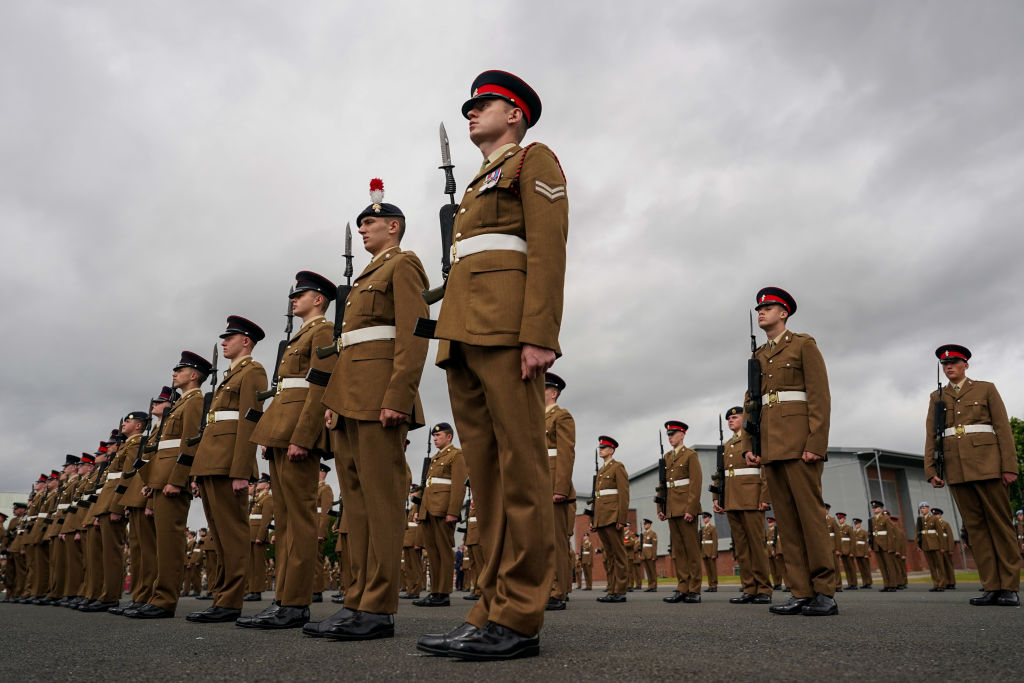To serve or not to serve? Pat McFadden, the chancellor of the Duchy of Lancaster, has declared that the UK government has no plans to introduce conscription. Meanwhile, the President of Latvia, which recently resuscitated conscription, has suggested many other European countries should do as they do. Given the state of the world, the UK would do well to reconsider its position.
Every few months or so, someone proposes that the UK should bring military service back. And each time, this undertaking is supposed to perform different functions: teach teenagers to become adults; keep teenagers out of trouble; magically solve the armed forces’ recruitment woes. But now the old world order is rapidly deteriorating, so rapidly that Prime Minister Keir Starmer has – so to speak – bitten the bullet and set a speedy deadline for his long-vague defence spending increase.
The last time a world order rapidly deteriorated, in the late 1940s, Britain already had military service. It continued until the early 1960s, when the UK – unlike most other western European countries – decided it was no longer needed. But in the year 2025, matters aren’t as manageable as they were during the Soviet reign of Nikita Khrushchev. Given the prospect of the United States leaving Nato, either formally or de facto, it’s no surprise that Poland has just announced it will teach all its men military skills. The country aims to expand its armed forces to comprise half a million men and women, Prime Minister Donald Tusk said.
Here in the UK, we’re fortunate not to be quite in medias res the way Poland and Latvia are. But we face the same question as them and our other allies: who is going to conduct the defence we need? Yes, the UK too needs more soldiers. In fact, now is the perfect time for manpower innovation (which, of course, includes women in uniform too). If there is anything positive about the miserable situation in which we find ourselves, it’s that it provides a powerful reason to innovate.
My favourite model of military service was almost accidentally introduced by Norway in the 1990s and 2000s, when the peace dividend meant the armed forces were cut. That meant cutting the number of conscripts, too – which meant that the armed forces could choose the best young men rather than training all of them, as it previously had. From 2016, when military service was extended to women, the armed forces could choose the best men and women for their comparatively small number of conscript places, which made military service even more attractive. Today, Norway (and Sweden, which has adopted the Norwegian model) shows that conscription can be like: a training programme so selective that young men and women compete to be accepted. Having done military service is the best possible entry on young (and no-longer-young) Norwegians’ CVs.
It is a model we could introduce here in the UK. National security would benefit, the military would benefit, and the men and women selected would benefit too. During the 2024 election campaign, the Conservatives – whom, it seems, had read my various writings on the Norwegian model over the years – tried to bring fresh ideas into the election campaign by proposing a Norway-like model. The proposal was, alas, not properly thought through. Now Starmer’s government instead has the time to properly study the Norwegian model and adapt it for the UK. In a 2019 report for Rusi, I proposed launching selective national service not just in the armed forces but also in other national security-related parts of the government. This way, the NHS too would have a reserve on which to draw during crises and we wouldn’t have to improvise measures like Matt Hancock’s Covid NHS Army.
There’s one more thing: doing military service helps young people realise that the military is not a different world. When we, the general public, view the military as somehow different from the rest of society, it leads to a twisted perception of it, one that ranges from hero worship to disdain. In reality soldiers are, of course, simply citizens wearing uniform. When young men and women are brought into the military as conscripts, they strengthen the link between the military and other parts of society. What’s more, in Norway, around a quarter of those in military service decide that they like it so much that they become professional soldiers.







Comments